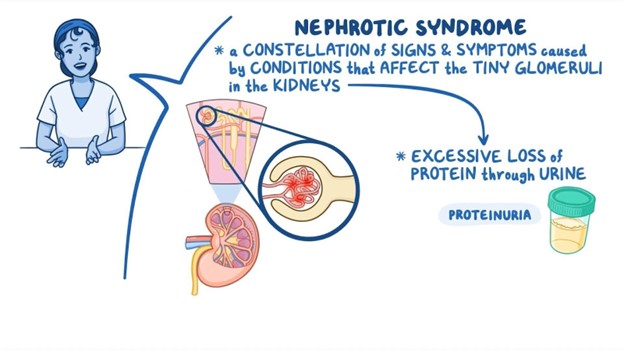A nurse is preparing to administer amoxicillin 30 mg/kg/day divided equally every 12 hr to a toddler who weighs 33 lb. Available is amoxicillin 200 mg/5 mL suspension. How many mL should the nurse administer? (Round the answer to the nearest tenth. Use a leading zero if it applies. Do not use a trailing zero.)
The Correct Answer is ["5.625"]
To calculate the dose of amoxicillin for the toddler:
Step 1: Convert the toddler's weight from pounds to kilograms.
33 lb ÷ 2.2 (lb to kg conversion factor) = approximately 15 kg
Step 2: Calculate the total daily dose of amoxicillin.
Dose = 30 mg/kg/day × 15 kg = 450 mg/day
Step 3: Divide the total daily dose into equal doses every 12 hours.
450 mg/day ÷ 2 doses = 225 mg/dose
Step 4: Calculate the amount of amoxicillin suspension needed for each dose.
The available concentration is 200 mg/5 mL, so for 225 mg, you would use the proportion:
225 mg : 200 mg = x mL : 5 mL
Cross-multiplying: x = (225 mg × 5 mL) / 200 mg ≈ 5.625 mL
Therefore, the nurse should administer approximately 5.625 mL of amoxicillin suspension for each dose.
Nursing Test Bank
Naxlex Comprehensive Predictor Exams
Related Questions
Correct Answer is A
Explanation
A. "I will continue to check his blood sugar two times every day."
Correct Explanation: This statement indicates a need for further instruction.
Explanation: A child with type 1 diabetes requires frequent blood sugar monitoring, especially during illness. Checking blood sugar only twice a day is not sufficient, especially when the child has an upper respiratory infection. Illness can impact blood sugar levels, so more frequent monitoring is necessary to ensure proper diabetes management.
B. "I will report a change in her breathing or any signs of confusion."
Incorrect Explanation: This statement shows awareness of potential complications and the need to monitor for them.
Explanation: Children with type 1 diabetes are at risk of diabetic ketoacidosis (DKA) when they are sick. Changes in breathing patterns and signs of confusion are symptoms of DKA. Reporting these symptoms is important, as it could indicate a serious diabetic complication.
C. "I will encourage her to drink half a cup of water or sugar-free fluid every 30 minutes."
Incorrect Explanation: This statement demonstrates proper fluid management, especially during illness.
Explanation: Encouraging the child to stay hydrated with sugar-free fluids is essential, particularly when the child has an upper respiratory infection. Proper hydration helps prevent dehydration, which can be more concerning for a child with diabetes.
D. "I will notify the doctor if her temperature is not controlled by acetaminophen."
Incorrect Explanation: This statement shows an understanding of the importance of managing fever in a child with diabetes.
Explanation: Children with diabetes can experience difficulty managing blood sugar levels when they're sick. Fever can exacerbate this issue. Using acetaminophen to control fever is appropriate, and notifying the doctor if fever persists is a responsible action.
Correct Answer is B
Explanation
A. Apply cool sterile soaks to the child's head.
Explanation: Applying cool sterile soaks to the child's head would not directly address periorbital edema. Nephrotic syndrome is a kidney disorder that results in proteinuria (loss of protein in urine), leading to fluid accumulation and edema. Cooling the head would not have a significant impact on reducing periorbital edema caused by nephrotic syndrome.
B. Apply warm compresses.
Explanation: Correct Choice. Applying warm compresses can help increase blood circulation and promote the reabsorption of excess fluid causing periorbital edema. Warmth can dilate blood vessels and improve the movement of fluids, potentially alleviating the edema.
C. Encourage the child to eat low protein foods.
Explanation: While dietary modifications might be part of managing nephrotic syndrome, specifically encouraging low protein foods may not directly address periorbital edema. The primary treatment for nephrotic syndrome involves medications to control proteinuria and manage fluid balance.
D. Elevate the head of the bed.
Explanation: Elevating the head of the bed is more commonly used to manage conditions like heart failure or obstructive sleep apnea. It might have some impact on overall fluid distribution, but it's not the most effective measure for reducing periorbital edema caused by nephrotic syndrome.

Whether you are a student looking to ace your exams or a practicing nurse seeking to enhance your expertise , our nursing education contents will empower you with the confidence and competence to make a difference in the lives of patients and become a respected leader in the healthcare field.
Visit Naxlex, invest in your future and unlock endless possibilities with our unparalleled nursing education contents today
Report Wrong Answer on the Current Question
Do you disagree with the answer? If yes, what is your expected answer? Explain.
Kindly be descriptive with the issue you are facing.
